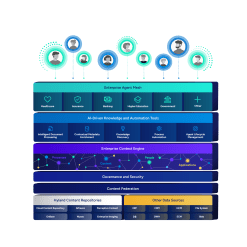Loire-Atlantique Departmental Council
French county agency introduces Hyland's Alfresco platform, which became a critical application for 4,500 users in just one year.

Harness the power of a unified content, process and application intelligence platform to unlock the value of enterprise content.
Learn more
Automate your document-centric processes with AI-powered document capture, separation, classification, extraction and enrichment.
Learn about Hyland IDPIt's your unique digital evolution … but you don't have to face it alone. We understand the landscape of your industry and the unique needs of the people you serve.
 Overview of industries
Overview of industries
Countless teams and departments have transformed the way they work in accounting, HR, legal and more with Hyland solutions.
 Overview of departments
Overview of departments
We are committed to helping you maximize your technology investment so you can best serve your customers.
 Overview of services
Overview of services

Discover why Hyland is trusted by thousands of organizations worldwide.
Hear from our customers
Our exclusive partner programs combine our strengths with yours to create better experiences through content services.
Overview of partners
Join The Shift newsletter for the latest strategies and expert tips from industry leaders. Discover actionable steps to stay innovative.
Register now
Hyland connects your content and systems so you can forge stronger connections with the people who matter most.
Learn about HylandWith our modern, open and cloud-native platforms, you can build strong connections and keep evolving.
 Dig deeper
Dig deeper
Reading time minutes
French county agency introduces Hyland's Alfresco platform, which became a critical application for 4,500 users in just one year.
Loire-Atlantique, a French county wedged between Brittany and Pays de Loire, ranks 12th in the country in terms of population. The Departmental Council manages a €1,305 billion budget.
The digital solutions department (IT department) wanted to provide a cross- organizational tool that:
Hyland's Alfresco platform was selected to increase collaboration across the departments within the Loire-Atlantique council. The main challenge was to make the new practices part of employee habits. The solution had to be identified by all as meeting their needs and bringing real benefits in terms of collaboration and information sharing.
The project coincided with the implementation of a far-reaching organizational reform aiming to decentralize several departments, from the headquarters in Nantes to six territories. This larger project represented a real opportunity to demonstrate Alfresco’s usefulness.
— Safia D’Ziri, CIO at the Departmental Council
Digital transformation consulting firm Lecko helped the Loire-Atlantique council define the change management strategy, particularly in terms of training requirements.
The project launch was intentionally low-key: A “serious game” was posted on the intranet for two weeks, encouraging employees to assess their knowledge of collaboration. Different types of training were offered, depending on individual answers: beginner, intermediate or advanced. As a result, out of 800 people who played the “serious game,” 400 registered for a training session.
A combination of word of mouth, curiosity from seeing their colleagues receive training and announcements by the Communications Department led another 2,000 employees to sign up for training over one year.
Back at their desks, users had access to the “collaborative spaces” and to a “sandbox” for the least confident.
“Even though we were keen to facilitate a change in habits for all, the objective was never to train everyone but to encourage new uses, including for users far removed from the digital world,” said Safia D’Ziri, CIO at the Departmental Council.
“Scouts” were identified at the start of the change management project. As beta testers of the new features, they helped the solution evolve significantly. They provided first-level support to their colleagues, for which they received dedicated training. They encouraged the use of collaborative spaces by asking questions or sharing information.
Three types of collaborative spaces were developed:
The last two were instrumental in supporting the organizational project of decentralization of the departments. The spaces allow the new entities, which are geographically distant from each other, to communicate or get answers to questions fueled by the reorganization. From the start, the collaborative spaces have provided valuable support for the far-reaching managerial project. As a result, what was a potentially conflicting reorganization project turned out to be a real opportunity to promote the Alfresco platform project.
Related articles
The “best-practice sharing” spaces rapidly met considerable success because of the added value they bring. They allow users to work differently, to share information regardless of the hierarchical structure and to federate business activities across several departments.
After a year, feedback on the Alfresco platform usage showed that it would be impossible to go back. Its widespread use and versatility turned the platform into one of the 10 critical applications that justify operational measures such as high availability.
“One wonders, how did users manage before?” D’Ziri said.
For example, cooks located in different high schools spontaneously share tips on how to deal with food allergies. They weren’t communicating so much before because they regarded email as less relevant to their needs.
To date, there are approximately 450 collaborative spaces. Some are closed at the end of a project, while others are created when a new project begins. Five hundred partners use Alfresco, in addition to 4,000 employees, as external access was allowed from the start.
Several factors explain the Alfresco platform’s success: